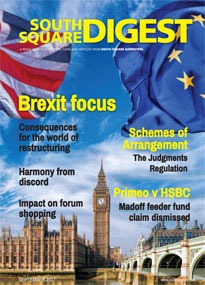

Ryan Perkins considers the application of the Judgments Regulation in the light of the recent DTEK and Global Garden Judgments
This article explores the application of the Judgments Regulation to schemes of arrangement under Part 26 of the Companies Act 2006. The true scope of the Judgments Regulation is a notorious issue among restructuring lawyers, and has been debated in numerous cases over the years. The debate has been reinvigorated by a series of new cases, including Re DTEK Finance plc [2017] BCC 165 (Newey J) and Re Global Garden Products Italy SpA [2016] EWHC 1884 (Ch) (Snowden J). These cases consider, among other things, whether a scheme with only one UK-domiciled creditor is capable of falling within Article 8 of the Judgments Regulation; and whether an asymmetric English jurisdiction clause is capable of falling within Article 25 of the Judgments Regulation. It is respectfully suggested that some of the provisional views expressed in Global Garden should not be followed.
Introduction
The scheme of arrangement is a powerful restructuring tool. If a company proposes a scheme to restructure its debts, and the scheme is approved by a majority in number representing 75% of the creditors in each class, then the Court has the power to sanction the scheme such that it is binding on all creditors: see section 899 of the Companies Act 2006. However, before the Court sanctions the scheme, the Court must be satisfied that it has international jurisdiction to do so.
It is frequently the case that one or more scheme creditors are domiciled outside of the UK in another EU Member State. In those circumstances, the Court must consider whether its jurisdiction to sanction the scheme is affected by Regulation (EU) No. 1215/2012 on jurisdiction and the recognition and enforcement of judgments in civil and commercial matters (recast) (the “Judgments Regulation”, also known as the Brussels Regulation or Brussels I).<sup>1</sup>
The Judgments Regulation applies in “civil and commercial matters”. Chapter II of the Judgments Regulation deals with jurisdiction, whereas Chapter III deals with the recognition of foreign judgments. The Judgments Regulation is something of a double-edged sword for scheme proponents. On the one hand, Chapter III has proven to be tremendously useful in persuading the English Court that schemes will be automatically recognised in other EU jurisdictions, and thereby achieve a substantial effect. On the other hand, Chapter II has proven to be something of a nuisance, and gives rise to a number of confusing jurisdictional issues.
The basic principle underlying Chapter II of the Judgments Regulation is that any person domiciled in an EU Member State must be sued in the courts of that Member State (the “Domicile Rule”): see Article 4(1). It is unclear whether and, if so, how the Domicile Rule applies to schemes of arrangement. It has been suggested that scheme creditors could be treated as being “sued” by the scheme company for the purposes of the Domicile Rule. This analysis would entail that creditors domiciled in EU Member States other than the UK should not be included in schemes of arrangement unless one of the exceptions in Chapter II of the Judgments Regulation is found to be applicable. The correctness of this analysis is currently unresolved, and has been left open in a number of cases: see Re Rodenstock GmbH [2012] BCC 459 at [60] (Briggs J); Re Seat Pagine Gialle SPA [2012] EWHC 3686 (Ch) at [13] (David Richards J); Re Primacom Holdings GmbH v Credit Agricole [2013] BCC 201 at [11]-[13] (Hildyard J); Re Nef Telecom BV [2014] BCC 417 at [38]-[39] (Vos J); Re Vietnam Shipbuilding Industry Group [2014] BCC 433 at [10] (David Richards J); Re Apcoa Parking Holdings GmbH [2014] BCC 538 at [24] (Hildyard J); Re Magyar Telecom BV [2014] BCC 448 at [28]-[31] (David Richards J) and Re Van Gansewinkel Groep BV [2015] Bus LR 1046 (Ch) at [41]-[45] (Snowden J), among others.
In order to avoid the need to resolve this issue, the Court has developed the practice of considering whether jurisdiction would exist under Chapter II of the Judgments Regulation on the assumption that it applies to schemes of arrangement. If jurisdiction can be found, it is not necessary to test that assumption. It is prudent to proceed, for present purposes, on the basis that Chapter II of the Judgments Regulation applies to schemes of arrangement.
Chapter II of the Judgments Regulation contains a number of exceptions to the Domicile Rule. An important task for any scheme proponent (where the scheme affects EU-domiciled creditors) is to identify which of those exceptions give the English Court jurisdiction to sanction the scheme. The most important exceptions, for present purposes, are set out in Articles 8 and 25.
Article 8 provides: “A person domiciled in a Member State may … be sued … (1) where he is one of a number of defendants, in the courts for the place where any one of them is domiciled, provided the claims are so closely connected that it is expedient to hear and determine them together to avoid the risk of irreconcilable judgments resulting from separate proceedings …” Article 8(1) has been invoked in many recent cases to establish that, where some of the scheme creditors are domiciled in the UK, the English Court has jurisdiction to sanction a scheme affecting the rights of creditors domiciled elsewhere in the EU. Since it is normally possible to identify at least a handful of UK-domiciled scheme creditors, this line of argument has proven to be a powerful tool in practice. Indeed, it is one of the key ways in which restructuring lawyers have been able to prevent the Judgments Regulation from limiting the scheme jurisdiction of the English Court.
The other key provision is Article 25, of which paragraph (1) provides: “If the parties, regardless of their domicile, have agreed that a court or the courts of a Member State are to have jurisdiction to settle any disputes which have arisen or which may arise in connection with a particular legal relationship, that court or those courts shall have jurisdiction … Such jurisdiction shall be exclusive unless the parties have agreed otherwise.” Article 25 is typically invoked where the underlying contracts between the scheme company and its creditors contain an English jurisdiction clause. In such cases, it has been argued that the English Court has jurisdiction to sanction the scheme irrespective of where the scheme creditors are domiciled, because the scheme creditors have contractually submitted to the jurisdiction of the English Court.
Thus far, every known scheme of arrangement has been held to fall within either Article 8 and/or Article 25 of the Judgments Regulation. However, if a future scheme does not fall within Article 8 or Article 25, and none of the other exceptions to the Domicile Rule are applicable, then the scheme company would have to argue that Chapter II of the Judgments Regulation does not apply to schemes at all. This would be a hard-fought argument, which would be fit for consideration by the Supreme Court and/or the European Court of Justice. Rather than engaging in such an argument, scheme companies have a strong incentive to find a way of establishing that their schemes fall within Article 8 and/or Article 25.
Two issues often arise in practice. The first issue is whether the existence of a single UK-domiciled creditor (potentially holding a very low proportion of the total scheme liabilities) is capable of bringing a scheme within Article 8. The second issue is whether an asymmetric jurisdiction clause is capable of falling within Article 25. These issues are considered below.
Article 8: how many UK creditors are required?
Pursuant to Article 8, the English Court has jurisdiction to sanction a scheme involving a creditor (C1) who is domiciled in an EU Member State other than the UK if two conditions are satisfied. The first condition is that at least one other scheme creditor (C2) is domiciled in the UK. The second condition is that the “claims” by the scheme company against C1 and C2 are so closely connected that it is “expedient” for the scheme to bind both creditors so as to “avoid the risk of irreconcilable judgments resulting from separate proceedings”.
It has never been entirely clear how Article 8 operates in the scheme context. The reference to “avoid[ing] the risk of irreconcilable judgments” is particularly difficult to apply to a scheme, which is designed to restructure a company’s debts rather than to avoid irreconcilable judgments. Questions of numerosity also arise. How many creditors should be domiciled in the UK (by number and value) in order for Article 8 to apply? Is one creditor enough? Or will the Court expect more?
The authorities do not provide consistent answers to this question. Some of the authorities indicate that Article 8 can be satisfied if a single scheme creditor is domiciled in the UK: see Re NEF Telecom Co BV [2014] BCC 417 at [43] (Vos J); Re Zlomrex International Finance SA [2014] BCC 440 at [15] (Mann J); and Re Metinvest BV [2016] EWHC 79 (Ch) at [32] (Proudman J). An alternative view was espoused, at least to some degree, by Snowden J in Re Van Gansewinkel Groep BV [2015] Bus LR 1046 (Ch) at [51]:
“On the assumption that the recast Judgments Regulation applies, art.8(1) would be potentially engaged provided that at least one creditor is domiciled in England and it is expedient to hear the ‘claims’ against all other scheme creditors together with the ‘claim’ against him. In the instant case, the numbers and size of the scheme creditors domiciled in England were far from immaterial, and in my judgment they were sufficiently large that the test of expediency was satisfied. I therefore considered that I was entitled to regard all scheme creditors as coming within the jurisdiction of the English court under art.8(1) for the purposes of the exercise of the scheme jurisdiction in relation to them.”
Snowden J thus looked at whether the numbers and size of the scheme creditors domiciled in England “were sufficiently large that the test of expediency was satisfied.” Snowden J returned to this topic in his judgment in Re Global Garden Products Italy SpA [2016] EWHC 1884 (Ch) at [25]:
“In a number of cases, the courts have expressed the view that on the assumption that the recast Judgments Regulation applies to schemes, and treating the company as claimant which is suing the scheme creditors, provided that at least one such creditor is domiciled in the United Kingdom, art.8 is potentially engaged. The question will then be whether it would be expedient to hear and determine the application for sanction of the scheme as regards the other creditors to avoid inconsistent judgments from separate proceedings. On one view, this question will necessarily be answered in the affirmative because of the desirability of binding all scheme creditors to the same restructuring: see Re Metinvest BV [2016] EWHC 79 (Ch) at [33]. Alternatively, the answer may depend upon a consideration of the number and value of the creditors domiciled in the United Kingdom: see Re Van Gansewinkel Groep BV at [41]-[45].”
Snowden J went on to conclude (at [28]) that jurisdiction could be established under Article 8 “on the basis that sufficient creditors by number and value are domiciled in the United Kingdom and that it is expedient to determine whether the scheme should bind the other scheme creditors in these proceedings in England.” Further, Snowden J specifically required the scheme company to adduce detailed evidence as to the number and value of UK creditors, and held that the original evidence was “inadequate” and “unsubstantiated”: see the judgment at [27].
The most recent and detailed consideration of this matter is to be found in the judgment of Newey J in Re DTEK Finance plc[2017] BCC 165 (convening hearing) , which adopts a rather different approach. In that case, only two scheme creditors holding less than one per cent of the total scheme liabilities (by value) were domiciled in the UK. Newey J held that Article 8 applied, such that the Court had jurisdiction to sanction the scheme. Moreover, Newey J expressed the “provisional view” that the Court would have had jurisdiction to sanction the scheme even if only one creditor, holding a very low proportion of the total scheme liabilities, had been domiciled in the UK. He referred to the authorities set out above, and said (at [17]-[18]):
“Article 8(1) of the recast Judgments Regulation does not in terms require more than “any one” defendant to be domiciled in the jurisdiction. The article goes on to make reference to whether “claims are so closely connected that it is expedient to hear and determine them together to avoid the risk of irreconcilable judgments resulting from separate proceedings”, but again it is not said that the number of domiciled defendants determines whether it is “expedient” to hear and determine matters together. On the face of it, the focus is on how “closely connected” the claims are rather than where other defendants are domiciled. In the circumstances, it seems to me, at any rate provisionally, that assessing “expediency” in this context must involve more than merely looking at how many creditors beyond one are domiciled in the jurisdiction or the value of the debts that they hold.
There is a persuasive argument that at least in the case of a company such as this one, which is incorporated in this jurisdiction and has its centre of main interests (or “COMI”) in England, the existence of just one creditor with a domicile here will make it expedient for an English court to hear an application for a scheme of arrangement to be approved. In the case of an English incorporated company, with its COMI in the jurisdiction, there might be said to be a legitimate expectation on the part of creditors that any restructuring would occur either in this jurisdiction or, perhaps, in the jurisdiction of the law governing the debts. Creditors would seemingly have no expectation of a restructuring being the subject of proceedings in their own home jurisdictions, where those are different. In any case, the claim against the “defendant” domiciled here might be thought to be so “closely connected” to the claims against other “defendants” as to make it “expedient” for the claims to be dealt with together. As Snowden J noted [in Global Garden], the desirability of binding all scheme creditors to the same restructuring is, on one view, sufficient to establish the requisite expediency.”
It is suggested that the provisional view expressed by Newey J is correct, and is preferable to the approach taken in Van Gansewinkel. The critical requirement under Article 8 is that at least one scheme creditor is domiciled in the UK. Beyond that, Article 8 does not impose any requirement for the Court to consider the number or value of UK-domiciled creditors, and the Court should not ordinarily need to consider this issue in detail.<sup>2</sup> The Court must, of course, be satisfied that it is “expedient” for all relevant creditors to be bound by the scheme in order to “avoid the risk of irreconcilable judgments resulting from separate proceedings”. But this does not, or does not principally, involve any consideration of the precise number or value of UK-domiciled creditors. The better view is that, in the vast majority of cases, it is inherently expedient for all creditors in a given class to be bound by the scheme, because any creditors who were not so bound would be able to obtain judgment against the scheme company on the full amount of their claims, thereby undermining the restructuring. Although Newey J restricted his analysis to companies incorporated in the UK, the same analysis should logically apply to any foreign company which has a sufficient connection to the UK.<sup>3</sup> From that perspective, it should not be difficult to show that a scheme falls within Article 8.
At the DTEK sanction hearing, the judge (Norris J) adopted largely the same approach: see [2016] EWHC 3563 (Ch). He said (at [22]-[25]):
“The gateway to article 8 is opened by the presence of a single defendant within the English and Welsh jurisdiction. It would therefore seem odd if the test of “expediency” should somehow sub silentio require more than one defendant in the jurisdiction. What the proviso to me seems to focus upon is not the number of defendants who are present in England and Wales, but the number of defendants who are domiciled in other Member States, and upon the significance of the risk of an irreconcilable judgment in the courts of the domiciles of those other defendants …
In the instant case it seems to me that an irreconcilable judgment in another Member State would be destructive of the scheme of arrangement as a whole …
I therefore take the view that if there is one defendant in England and Wales who is a scheme creditor then the risk of some other scheme creditor proceeding in the courts of his own domicile to resist a claim that he be bound as a dissentient creditor is such that that risk of an irreconcilable judgment of itself satisfies the proviso.”
It is suggested that, contrary to Global Garden, scheme companies should not be required to adduce detailed evidence as to the precise number and value of creditors domiciled in the UK. Such evidence is not ordinarily relevant to determining whether Article 8 is engaged.
Article 25 and asymmetric jurisdiction clauses
In the rare case where no scheme creditor is domiciled in the UK, Article 8 will not apply, and the scheme company will need to rely on Article 25 instead. The paradigm case for the application of Article 25 is where the finance documents between the scheme company and the scheme creditors contain a conventional and straightforward exclusive jurisdiction clause in favour of the English Court. Article 25 will, in such cases, confer jurisdiction on the English Court to sanction the scheme.
However, many finance documents do not contain a straightforward exclusive jurisdiction clause. By way of example, the standard forms of syndicated facility agreements promulgated by the Loan Markets Association include the following asymmetric jurisdiction clause:
“(a) The courts of England have exclusive jurisdiction to settle any dispute arising out of or in connection with this Agreement (including a dispute relating to the existence, validity or termination of this Agreement or any noncontractual obligation arising out of this Agreement) (a “Dispute”).
(b) The Parties agree that the courts of England are the most appropriate and convenient courts to settle Disputes and accordingly no Party will argue to the contrary.
(c) This Clause is for the benefit of the Finance Parties and Secured Parties only. As a result, no Finance Party or Secured Party shall be prevented from taking proceedings relating to a Dispute in any other courts with jurisdiction. To the extent allowed by law, the Finance Parties and Secured Parties may take concurrent proceedings in any number of jurisdictions.”
This clause confers exclusive jurisdiction on the English Court, but it does so “for the benefit” of the finance parties (i.e. the scheme creditors) rather than the scheme company, and the finance parties are expressly permitted to commence proceedings against the scheme company in other jurisdictions. Having regard to the extensive use of the LMA’s asymmetric jurisdiction clause in finance documents worldwide, it is important to determine whether the clause falls within Article 25 of the Judgments Regulation so as to confer jurisdiction on the English Court to sanction a scheme of arrangement between a company and any of its creditors who are bound by the clause.
Four recent cases have considered this issue. The first case is Re Vietnam Shipbuilding Industry Group [2014] BCC 433 at [15]-[16], in which the scheme creditors were parties to a facility agreement modelled on one of the standard LMA forms. David Richards J held that the LMA’s asymmetric jurisdiction clause fell within Article 25, such that the English Court had jurisdiction to sanction the scheme. He noted that non-exclusive jurisdiction clauses plainly fall within Article 25 (as is apparent from the second sentence of Article 25 itself); and that, in those circumstances, there is no reason why the LMA clause should fall outwith Article 25.
The second case is the decision of Snowden J in Re Van Gansewinkel Groep BV [2015] Bus LR 1046 (Ch). The jurisdiction clause in that case stated as follows: “For the benefit of each of the finance parties, each obligor irrevocably submits to the exclusive jurisdiction of the courts of England for the purpose of hearing and determining any dispute arising out of this agreement and for the purpose of any enforcement of any judgment against its assets.” Snowden J held that the clause fell outwith Article 25, such that the scheme company could not rely on that Article to establish jurisdiction under the Judgments Regulation. He stated (at [49]):
“… this was not a clause by which any of the scheme creditors submitted to the jurisdiction of the English court at all. It was a submission to the jurisdiction only by the scheme companies. But the scheme companies were voluntarily invoking the scheme jurisdiction of the English court in any event. In my view, the issue under article 25(1) whether the English court had jurisdiction over the scheme creditors. In that respect, the fact that the jurisdiction clause was for the benefit of the scheme creditors did not assist …”
It should be noted that the clause in Van Gansewinkel was rather different from the standard LMA asymmetric jurisdiction clause which featured in Vietnam Shipbuilding. The LMA clause states that the parties (including the finance parties) submit to the jurisdiction of the English Court; whereas the clause in Van Gansewinkel merely states that the obligors (not including the finance parties) submit to the jurisdiction of the English Court. It is suggested that this is an important distinction. Under the Van Gansewinkel clause, the finance parties are free to challenge the jurisdiction of the English Court if the company commences proceedings there. By contrast, under the LMA clause, the finance parties are not free to advance such a challenge. They are entitled to commence proceedings against the company outside of England, but they are not entitled to contest the jurisdiction of the English Court once it is seised (because they have submitted to its jurisdiction). Accordingly, Van Gansewinkel and Vietnam Shipbuilding should be regarded as consistent.
The third case is the convening judgment in Re Hibu Group Ltd [2016] EWHC 1921 (Ch), before Warren J. The finance documents contained the standard LMA asymmetric jurisdiction clause. Warren J held that the clause fell within Article 25, and cited Vietnam Shipbuilding in support of this conclusion. He said (at [71]) that “paragraph (c) [of the LMA clause], whilst preserving a creditor’s right to sue elsewhere, does not allow a challenge to the jurisdiction conferred by paragraph (a) when the company commences proceedings in this court”. Warren J accepted counsel’s submission that the clause in Van Gansewinkel is distinguishable from the standard LMA clause.
The final and most problematic case is Re Global Garden Products Italy SpA [2016] EWHC 1884 (Ch), before Snowden J, in which the finance documents contained the standard LMA asymmetric jurisdiction clause. Snowden J suggested, obiter, that the clause did not fall within Article 25. He stated (at [31]):
“I would, however, indicate that my provisional view was that the alternative source of jurisdiction suggested by Mr Dicker, namely Article 25 of the Recast Judgments Regulation, would not have given jurisdiction … The jurisdiction clause in the Facilities Agreement … was expressed to be for the benefit of the finance parties only and, hence, could not be relied upon by the Company against those finance parties: see (for a similar point) Re Van Gansewinkel Groep at paragraphs 46 to 49.”
It is respectfully suggested that this provisional view is wrong, for three principal reasons.
First, Snowden J’s provisional view is inconsistent with Vietnam Shipbuilding and the Hibu convening judgment<sup>4</sup>.
Second, Van Gansewinkel does not support the view that the LMA clause falls outwith Article 25. This is because the clause in Van Gansewinkel is drafted in different terms from the LMA clause: see above. Snowden J rightly observed that the LMA clause is expressed to be “for the benefit” of the finance parties: but this simply enables the finance parties to sue the obligors in other jurisdictions, and does not negate the finance parties’ submission to the jurisdiction of the English Court. Were it otherwise, the first two paragraphs of the LMA clause would be very difficult to understand.
Third, the correct construction of the LMA clause has been considered by the Commercial Court in a number of cases, unrelated to schemes of arrangement, and the views expressed by the judges in those cases are inconsistent with the provisional view expressed in Global Garden. For example, in Mauritius Commercial Bank Ltd v Hestia Holdings Ltd [2013] 2 Lloyd’s Rep 121 at [40], Popplewell J held that the LMA clause involves a submission to the jurisdiction of the English Court by the finance parties, even though the clause is expressed to be for their benefit:
“Clause 24.1 [the LMA clause] is for the benefit of [the lender] in the sense that [the borrowers] are obliged to sue in England but [the lender] is not. But that does not disapply clause 24.1(a) to [the lender] completely. Where [the borrowers] bring suit against [the lender] in England, clause 24.1(a) is not disapplied by the operation of clause 24.1(c). [The lender] is thereby agreeing to be sued in England subject to the liberty conferred by clause 24.1(c). In those circumstances [the lender] has agreed to be subjected to the exclusive jurisdiction of the English courts, subject to its right to bring claims (which may overlap) abroad pursuant to clause 24.1(c). Were it otherwise, clause 24.1(a) would be superfluous: if clause 24.1(c) permitted [the lender] to insist on suing or being sued anywhere, or anywhere of competent jurisdiction, that would include England (given that this is an English law agreement and forum conveniens is conclusively determined by sub-clause (b)).”
Popplewell J’s remarks have been cited with approval by the Commercial Court in a number of other cases – including, most recently, Commerzbank Aktiengesellschaft v Liquimar Tankers Management Inc [2017] 1 Lloyd’s Rep 273, in which Cranston J held, after considering a number of legislative materials and authorities, that the LMA clause falls squarely within Article 25 of the Judgments Regulation. Mauritius Commercial Bank is not cited in Global Garden, and Commerzbank was decided several months later.
In conclusion, it is suggested that the LMA asymmetric jurisdiction clause falls within Article 25 of the Judgments Regulation, and confers jurisdiction on the English Court to sanction a scheme against any creditors who are bound by the clause. The same analysis may not apply to other bespoke clauses, e.g. the provision in Van Gansewinkel.
Conclusion
On any view, the language used in Chapter II of the Judgments Regulation is ill-suited to schemes of arrangement. The valiant attempts of practitioners and judges to bring schemes within Chapter II often lead to something of a parallel universe, in which words take on unexpected meanings.
However, unless and until the Court is required to determine whether Chapter II applies to schemes at all, the Court will be faced with the difficult task of shoehorning schemes into the various jurisdictional gateways set out therein. When approaching this task, it is hoped that the Court will not seek to impose unnecessary constraints which go beyond the text of the Judgments Regulation itself, so as to avoid the creation of artificial limitations on the scheme jurisdiction.
As matters stand, it is unclear how the Judgments Regulation will be affected by Brexit. In the absence of a convention for the enforcement of judgments and the allocation of civil jurisdiction between the UK and EU, the perennial jurisdictional debates about schemes of arrangement may finally be killed off: but so too would the UK restructuring market, which relies heavily on the automatic recognition of UK judgments throughout the EU. The difficult drafting of the Judgments Regulation may, on balance, be a low price to pay.
1/. The Judgments Regulation is the successor of Regulation (EC) No. 44/2001, which contains many similar provisions.
2/. See also Re Hibu Group Ltd [2016] EWHC 1921 (Ch) at [67] (Warren J): “When applying the test of expediency under Article 8(1), there is no basis for imposing a precise threshold on the number or value of creditors who are required to be domiciled in the UK.”
3/. As to the concept of sufficient connection, see Re Magyar Telecom BV [2014] BCC 448 at [14] (David Richards J).
4/. The Hibu convening hearing took place shortly before the Global Garden judgment was released, but shortly after the Global Garden sanction hearing. In the Hibu sanction judgment, [2016] EWHC 2222 (Ch) at [6]-[7], Arnold J held that it was unnecessary (on the facts) to decide whether the provisional view expressed in Global Garden was correct.







![Brake & Anor v The Chedington Court Estate Ltd [2023] UKSC 29](https://southsquare.com/wp-content/uploads/2024/02/Brake-Anor-scaled-e1728649908896.jpeg)









![NEW DECISION OF THE COURT OF APPEAL – Midland Premier Properties Ltd & Anor v Doal & Ors [2026]](https://southsquare.com/wp-content/uploads/2025/06/matthew-henry-VviFtDJakYk-unsplash-scaled-e1750083975207.jpg)